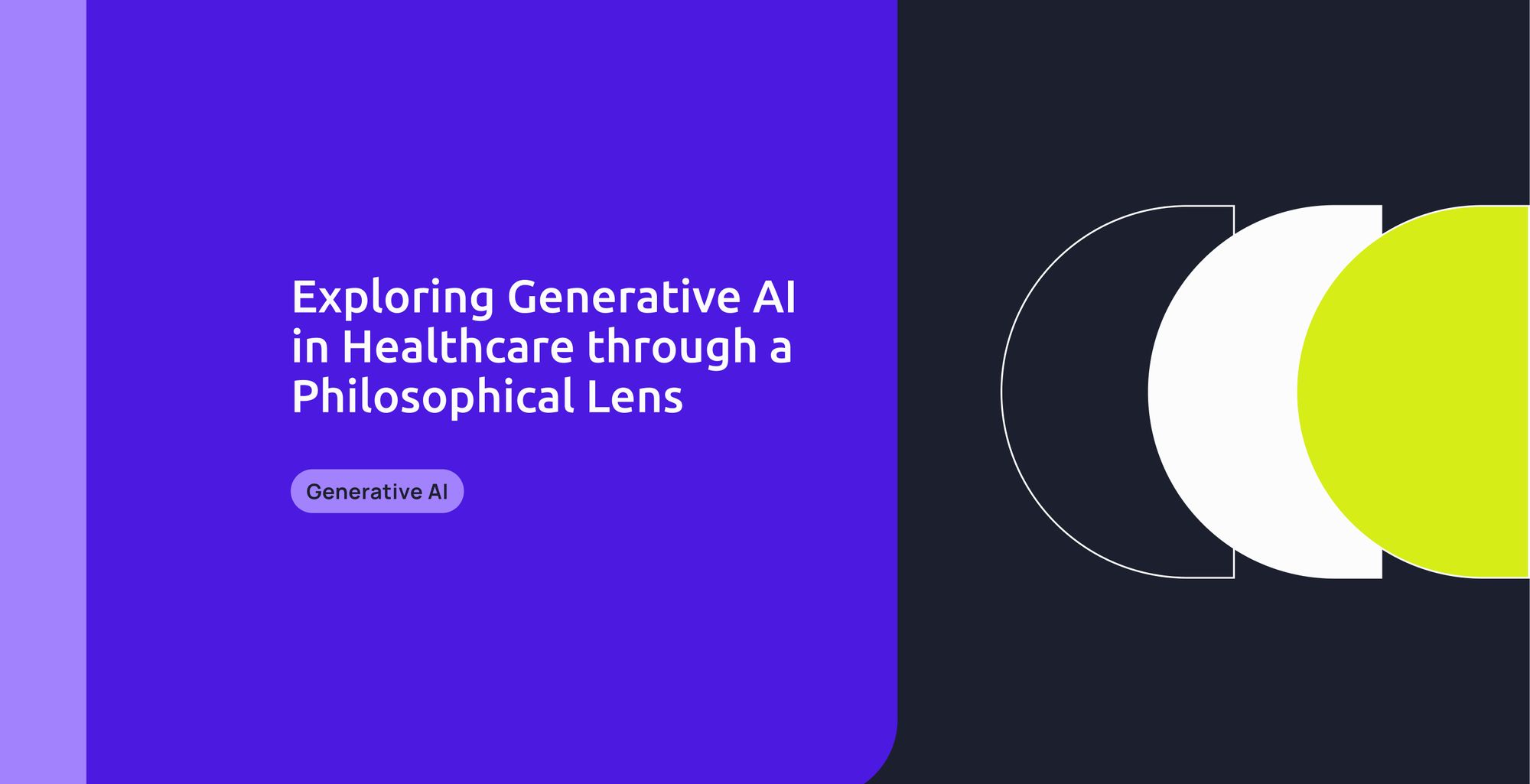Introduction
Generative AI, Gen AI: at this point, we’re sure you are familiar with these terms. In case you’d like to reinforce its meaning, we’ve long been studying and displaying its positive potential impact on medical advancement, patient cases, and caregivers' workload. From streamlining administrative processes, improving treatment outcomes, and reducing costs to empowering patients with knowledge and personal health data, Generative AI can be powerful while creating a balanced mix of human caregivers and their technical backgrounds and expertise.
This article aims to address this new technology from an under-explored perspective: its philosophical implications, the ethical and moral implications, and how it’s expected to evolve in the short term.
The Creation Phase of Generative AI
From a metaphor outlook, we can draw parallels between generative AI and the act of creation in art. Just as an artist confronts a blank canvas, the AI begins with raw data, employing a palette of algorithms to compose personalized interventions, much like an artist selecting colors for emotional impact. The data-driven composition, refined through iterative processes, mirrors the artistic refinement of a masterpiece.
Envision a future where the generative AI maestro conducts a transformative display for individual well-being; this metaphor highlights the potential for technology to harmonize with the canvas of health and wellness, orchestrating a new era of precision and personalization in healthcare.
From a more technical point of view, AI algorithms can 'create' solutions and insights in healthcare. Moreover, through its use in clinical decision support, GPT (Generative Pre-trained Transformer) models can help medical staff formulate recommendations for better decision-making that will enhance patient outcomes and the standard of care provided.
LLMs (Large Language Models) are a type of AI that can achieve general-purpose language understanding and generation. This area of Generative AI can develop patient-centered care. They can be able to comprehend complex medical texts, gather relevant data, and create educational materials for medical professionals and patients. When given the right guidance and supervision, they enhance user experiences, increasing process efficiency and, of course, reducing expenses.
A Technological Creative Healer
Generative AI has demonstrated creative problem-solving abilities in medical research and diagnostics, significantly advancing the field. One notable application is in medical image analysis, where AI-driven algorithms excel in detecting patterns and anomalies that might escape the human eye.
For instance, in radiology, generative AI has been employed to enhance the accuracy of tumor detection in medical imaging, such as X-rays, MRIs, and CT scans. The ability to swiftly analyze large amounts of data accelerates diagnosis and contributes to early detection and improved patient outcomes. This is key because experts talk about the future of healthcare being a preventive field, not a “reactive” one.
Moreover, generative AI has shown promise in drug discovery by efficiently navigating the complex field of molecular interactions. It accelerates the identification of potential drug candidates by predicting how different compounds might interact with biological targets, significantly reducing the time and resources required for drug development. This creative problem-solving approach can potentially revolutionize the pharmaceutical industry and accelerate the release of new treatments.
In personalized medicine, generative AI leverages patient data to tailor treatment plans based on individual genetic profiles, lifestyle factors, and medical history. This personalized approach enhances the effectiveness of interventions, showcasing the AI's ability to synthesize diverse sources of information for precise healthcare solutions. As generative AI continues to evolve, its impact on creative problem-solving in medical research and diagnostics may reshape healthcare, guiding a new era of efficiency, accuracy, and more personalized care.
The Ethics while Applying Generative AI in Healthcare
Now, let’s explore the moral considerations, in other words, the ethical factors surrounding generative AI in healthcare.
The ethical implementation of generative AI in healthcare needs to carefully examine moral considerations, focusing on issues such as patient privacy, consent, and the accountability of AI in decision-making processes.
When integrating generative AI into healthcare, maintaining the utmost respect for patient privacy is critical. Rigorous measures must be in place to ensure that sensitive medical data remains confidential, HIPAA-compliant, and accessed only for legitimate, authorized purposes.
Moreover, the ethical framework should prioritize obtaining informed consent from patients regarding using their data in AI applications, emphasizing transparency and empowering individuals to make informed choices about how their healthcare information will be handled.
The responsibility of AI in decision-making introduces a complex ethical dimension. Striking a balance between the efficiency of AI-driven decisions and maintaining human oversight is key. Ethical guidelines should delineate the boundaries of AI decision-making, clarifying when human intervention is required.
Ensuring that the AI aligns with established medical standards and respects the principles of beneficence and non-maleficence is essential. This ethical compass guides the responsible integration of generative AI in healthcare, promoting a thoughtful and considerate approach to the transformative potential of AI technologies in the medical field.
How to Address the Moral Dilemma
The accelerated evolution of technology demands a continuous process of reflection and adaptation.
Establishing robust ethical frameworks also requires a keen awareness of the various challenges, as ethical considerations may shift with technological advancements. The need for ongoing examination and adjustment is evident, recognizing that what is ethical today may require reassessment tomorrow. This reflection highlights the importance of being aware of the ethical implications of AI applications. This is to ensure that guidelines remain responsive to the complexities of the evolving IT field. In essence, the journey through the moral labyrinth involves a commitment to ongoing ethical scrutiny, encouraging a resilient framework that aligns with the ethical imperatives of the moment.
Augmented Humanity
When used ethically, AI and Generative AI may augment human intelligence and compassion, leading to a more holistic approach to healthcare. Generative AI can collaborate with healthcare professionals, enhancing their capabilities rather than replacing them. It’s interesting to present this as a symbiotic connection.
Clinician burnout is real and continues to grow. Multiple keynote speakers at hlth conference, (Healthcare’s biggest global event) addressed it. So, here’s a big opportunity for collaboration. Delving into the ethical application of AI in healthcare reveals its potential to enhance human capacity and compassion, encouraging a more holistic approach to medical practices.
When managed ethically, AI is a supportive tool, supplementing human capabilities rather than replacing them. By efficiently processing vast datasets, AI enables healthcare professionals to make more informed decisions, improving diagnostic accuracy and treatment planning. This "augmentation of intelligence" allows practitioners to focus on nuanced aspects of patient care, emphasizing empathy and interpersonal skills.
Moreover, AI contributes to the compassionate dimension of healthcare by streamlining administrative tasks, granting healthcare providers more time for direct patient interaction. A more patient and caregiver-centered practice can emerge from human-AI collaboration in healthcare.
Automated processes can handle routine and time-consuming activities, freeing healthcare professionals to engage more meaningfully with patients, understand their unique needs, and develop personalized care plans.
The symbiotic relationship between AI-driven efficiency and human compassion establishes a foundation for a comprehensive and empathetic healthcare approach. In essence, the ethical integration of AI augments the human touch in healthcare, providing a synergy that prioritizes both intellectual precision and compassionate care.
The Shadows of Uncertainty in AI, Generative AI and New Technologies
In examining AI from a philosophical standpoint, it is important to recognize and embrace uncertainty as an inherent aspect of the journey. This involves a continuous commitment to research, learning, and adaptation. By acknowledging AI's dynamic and evolving nature, we can better navigate its complexities and contribute to a more informed and thoughtful understanding of its implications in the broader philosophical discourse.
Conclusion
In conclusion, analyzing the symbiosis of generative AI and healthcare through a philosophical lens untangles the complex relationship between technology and humanity. The philosophical exploration shows an interplay where the potential of generative AI aligns with the intricate dynamics of healthcare.
As we dive deep, it becomes apparent that challenges are inherent, from ethical and privacy considerations to the delicate balance between automation and human touch. Yet, within this complexity lies the potential for positive transformation.
Harmony emerges when generative AI is harnessed purposefully, serving as a tool to amplify human intelligence and compassion rather than overshadowing them. The ability of AI to navigate intricate datasets and streamline processes complements the understanding and facilitates more empathetic care for healthcare professionals. It is a dance where technology and human insight merge, creating a synergy that has the power to revolutionize healthcare.
Acknowledging the challenges while embracing the potential, the intersection of generative AI and healthcare invites us to reflect on the philosophical implications of this transformative partnership. We can build a future where generative AI catalyzes positive change in healthcare through thoughtful consideration, ethical integration, and a commitment to preserving the human element.
Closing Thoughts
A deep call to technologists and caregivers comes to place. The transformative potential of this technology demands a collective commitment to responsible and ethical use. As we stand at the intersection of innovation and responsibility, it becomes crucial for us all, from policymakers to healthcare professionals and technologists, to steer the course of generative AI in healthcare with a shared sense of responsibility.
Let this not only be a technological advancement but a light guiding us toward a future where the power of AI is harnessed not just for efficiency but, more importantly, for the betterment of humanity in the pursuit of a healthier and more compassionate world.

